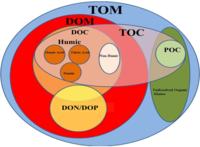
Photo from wikipedia
Abstract Knowledge of the impact of N enrichment on soil respiration components is critical for understanding carbon (C) cycling and its feedback processes with climate change. We conducted three N… Click to show full abstract
Abstract Knowledge of the impact of N enrichment on soil respiration components is critical for understanding carbon (C) cycling and its feedback processes with climate change. We conducted three N level addition experiments, control (CK, 0 g N m−2yr−1), low nitrogen addition (LN, 10 g N m−2yr−1), and high nitrogen addition (HN, 20 g N m−2yr−1)) to investigate the response of microbial and root respiration to N enrichment in a long-term fenced grassland on the Loess Plateau of China. Compared to the control, both the LN and HN treatments generally decreased soil respiration and its two components for both years. Under N addition, the decreased rates of root respiration and microbial respiration were significantly and positively correlated with the monthly root production and soil microbial biomass C, respectively. Nitrogen addition decreased the Q10 values of root and microbial respiration, with the reduction more pronounced in root respiration. Overall, our results suggest that N enrichment may reduce the soil C loss through CO2 emissions. With global warming, soil C loss will be less due to the lower Q10 values of root and microbial respiration on the Loess Plateau of China under future scenarios of N deposition.
Journal Title: Journal of Arid Environments
Year Published: 2018
Link to full text (if available)
Share on Social Media: Sign Up to like & get
recommendations!